The wave of artificial intelligence is surging from cities with technology giants to the "nerve endings" of vast China - counties at an unprecedented speed. This vast area, which carries hundreds of millions of people and connects the future of urban and rural areas, is becoming the ultimate testing ground for testing the inclusiveness and vitality of AI technology. County economy and people's livelihood scenarios are quietly becoming the new frontier of AI application.
How can AI not only stay between large enterprises and large cities, but also truly take root in the countryside and empower the grassroots? How to grasp the strategic window of county AI in the tide of the era of building a digital China?
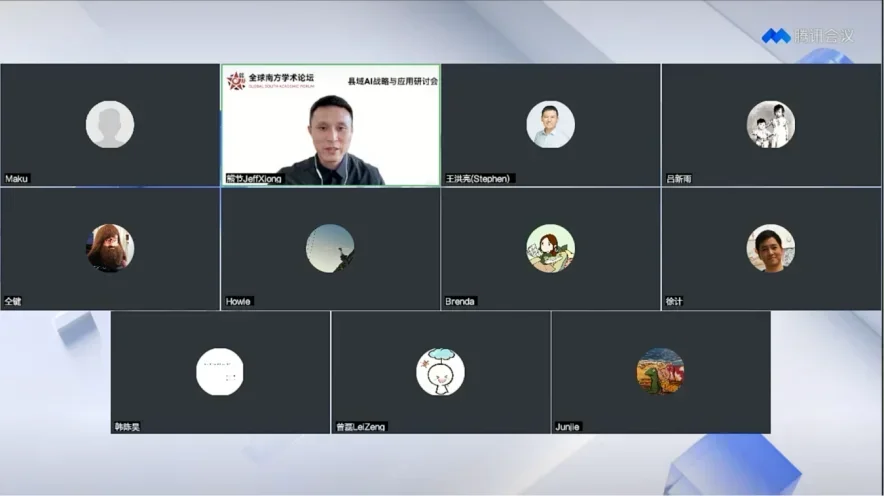
On July 5, 2025, the "County AI Strategy and Application Seminar" co-organized by the Global South Academic Forum and the AI Snowbird Club was successfully held in the form of an online conference, and was simultaneously live-broadcasted through the WeChat video account, attracting more than 3,500 people to watch online.
The meeting was addressed by Lv Xinyu, Dean of the Institute of International Communication of East China Normal University, and hosted by Xiong Jie, Secretary-General of the Global South Academic Forum. The meeting brought together experts and scholars from academia, industry and enterprises to conduct in-depth discussions on the strategic layout and practical application of AI technology in county development, focusing on the implementation path of AI to promote the digital transformation and high-quality development of county economy. The seminar set three core topics, and the participating experts had full exchanges and sharing.
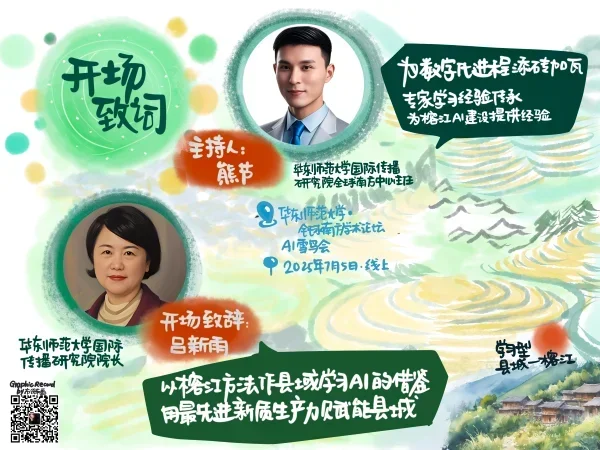
Topic 1From "tool" to "paradigm":Reshaping the cognitive framework of county development
This seminar started with a fundamental reflection on the positioning of AI in county development. Participating scholars generally believe that it is necessary to transcend the limitation of viewing AI as a simple "efficiency-enhancing tool" and deeply understand its revolutionary power as a "thinking paradigm". It requires us to re-examine the goals of development, the form of organization and even the way of survival of individuals.
Yang Jing | AI application empowers new quality productivity of county development
Yang Jing, an associate professor at Guizhou University, took Rongjiang, a poverty-stricken county in the west, as a sample to depict the realistic picture of counties embracing AI. Policy and financial support is "time", and technological development is "location", but weak infrastructure, lack of local talents, and insufficient digital capabilities of enterprises constitute huge challenges of "people". His suggestions go straight to the root: systematic investment is needed, from the introduction of "blood transfusion" projects to "hematopoietic" talent training and ecological construction.
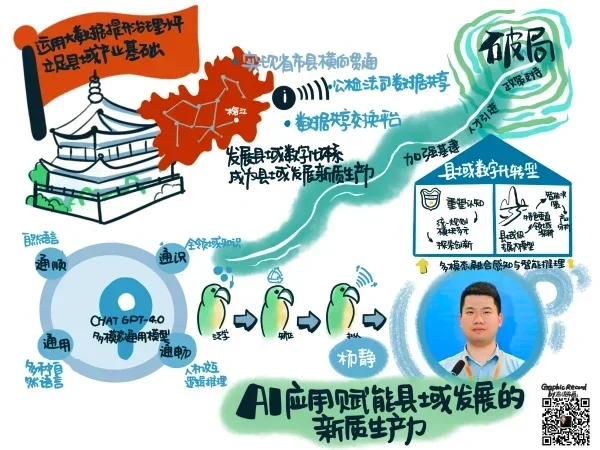
Shen Jian | AI takes humans from "finite games" to "infinite games"
Shen Jian, chief AI scenario scientist at Youpufeng, provides a philosophical perspective. He borrowed James Carse's theory and pointed out that traditional work is a "finite game" that pursues "victory" with clear rules and boundaries; the future of the AI era is an "infinite game" with the purpose of "survival" and the rules and participants are constantly evolving. The value of AI is not to perfectly replace repetitive labor, but to liberate humans from "finite games" and engage in more creative and flexible exploration. For counties with relatively limited resources, this may mean a possible path for asymmetric and leapfrog development.
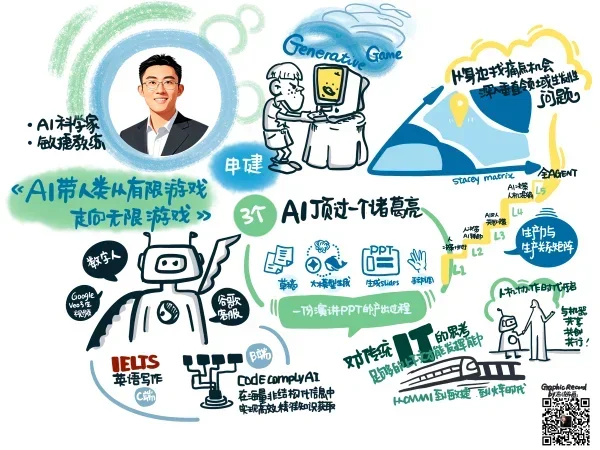
Xu Hao | Digitalization strategy and construction coordination
HSBC Chief Engineer Xu Hao turned his attention to the internal organization. He used the Cynefin framework to deconstruct the problems encountered in digital transformation into four scenarios: simple (Obvious), complicated (Complicated), complex (Complex) and chaos (Chaos). He emphasized that the decision makers and executors of the organization must first clearly diagnose their own situations in order to match the correct response strategy. Avoiding the use of "complex" solutions to deal with "complex" system problems is the key to the county's digitalization construction from chaos to order.
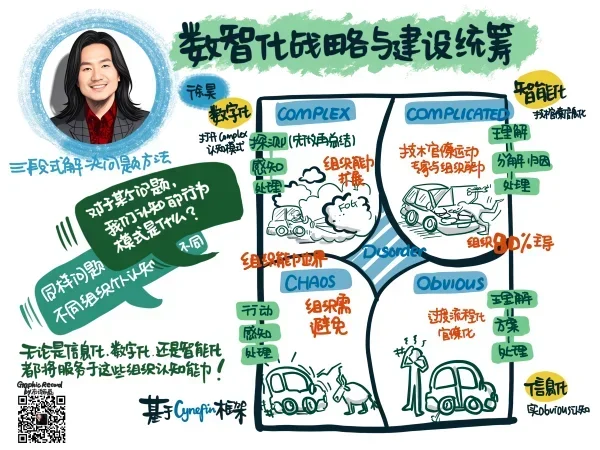
Tong Jian | Thinking about the application mode of LLM in knowledge work
Independent consultant Tong Jian made a calm analysis of the application of large language model (LLM) in knowledge work. He admitted that LLM is not a panacea, and its problems such as "illusion", noise, and overload may be magnified in county scenarios with uneven information quality. However, with the rise of large models on the end side and the differentiation of model capabilities, coexisting with LLM and making good use of its capabilities will become the core literacy of future knowledge workers. For counties, this means the need to cultivate a group of "barefoot developers" who understand both business and AI.
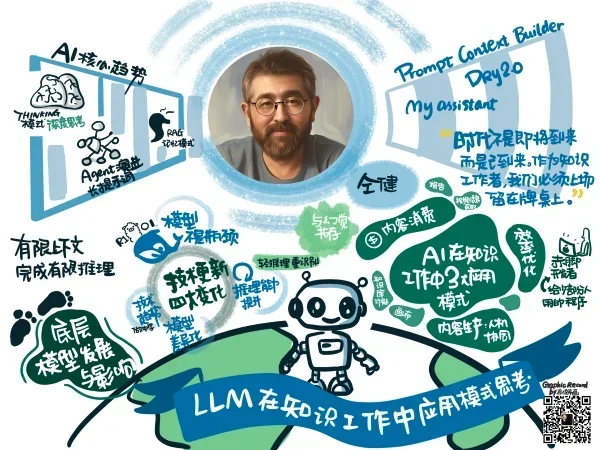
Zeng Zehua | Research and Application of Chinese Traditional Culture Big Model
Zeng Zehua, head of AI Big Model of Unilumin Technology, systematically elaborated on the research and development path of Chinese excellent traditional culture big model: taking philosophical thought as the soul and classical literature as the cornerstone, building a "text-multimodal" dual-track system. By cooperating with universities, integrating multiple data such as 3D cultural relics scanning and intangible cultural heritage images, focusing on overcoming the accuracy of classical Chinese understanding and multimodal fusion problems. At present, a series of Shanyin big model products with emotional companionship and professional question-and-answer capabilities have been developed, covering application scenarios such as smart speakers and educational figures.
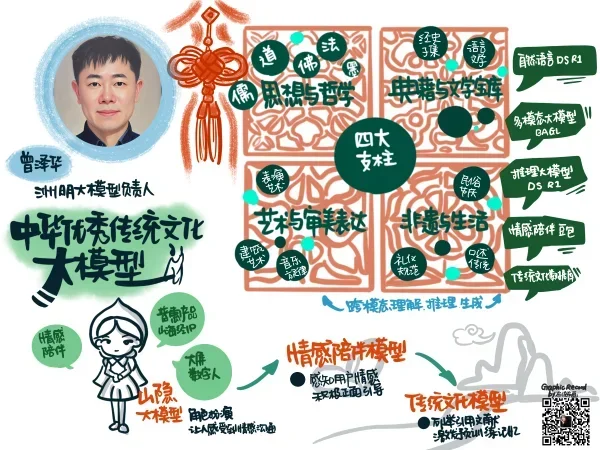
Topic 2From "blood transfusion" to "blood production": AI-driven local industry rebirth
If paradigm change is the "top-level design", then industrial application is the foundation for AI to "take root" in the county. Participants focused on county-level characteristic industries such as culture, tourism, and agriculture, and discussed how AI can shift from external empowerment to endogenous drive to cultivate sustainable development momentum that truly belongs to the local area.
Wang Qi | Smart Agriculture: Plant protection first, reshaping the ancient proposition of "relying on the sky for food"
Wang Qi, a distinguished professor at Guizhou University, pointed out that one of the core application scenarios of smart agriculture is plant protection. Through AI for pest and disease identification, pesticide molecular design, and intelligent early warning, the ancient problem of "relying on the sky for food" can be accurately solved. The research results he shared showed how AI can provide county-level agriculture with a full-chain intelligent solution from breeding to dining table, which has dual significance for ensuring national food security and promoting farmers' income.
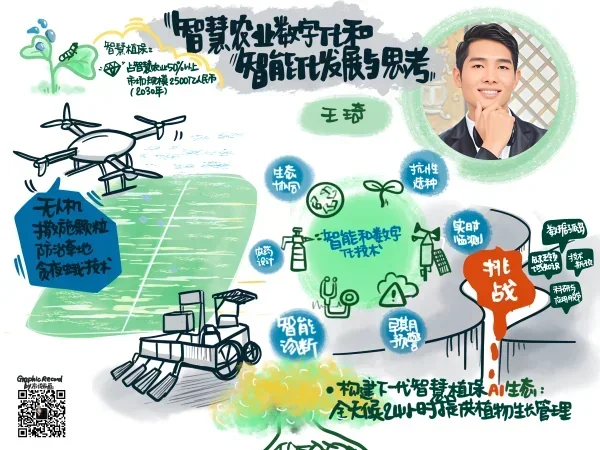
Xu Guoteng | "AI+New Infrastructure": Unlocking the Immersive Future of County-level Cultural Tourism
Xu Guoteng, associate professor at Guizhou University, believes that the future of county-level cultural tourism lies in "cultivating new momentum." AI can not only improve product creativity on the supply side, but also create new consumption scenarios by meeting consumers' personalized and immersive experience needs. At the same time, AI is also a powerful tool for "telling good county stories" and can help local culture achieve efficient international communication.
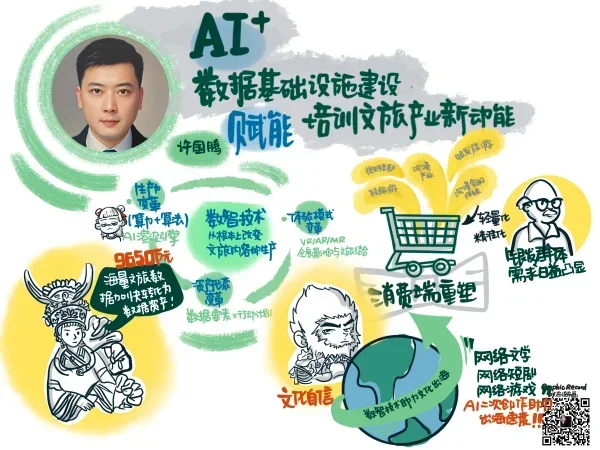
Zhang Ansi | Smart flight in the village: How the low-altitude economy can enter the homes of ordinary people
Zhang Ansi, an associate professor at Guizhou University, has expanded his vision to the emerging field of "smart flight in the village". The application of drones in agricultural plant protection, logistics distribution, and emergency inspections is opening up a new track for the "low-altitude economy" for the county economy. However, safety, efficiency, and cost are still the three mountains that lie ahead. His research is dedicated to conquering core technologies such as flight control and data processing, with the goal of making smart flight truly "enter the homes of ordinary people."
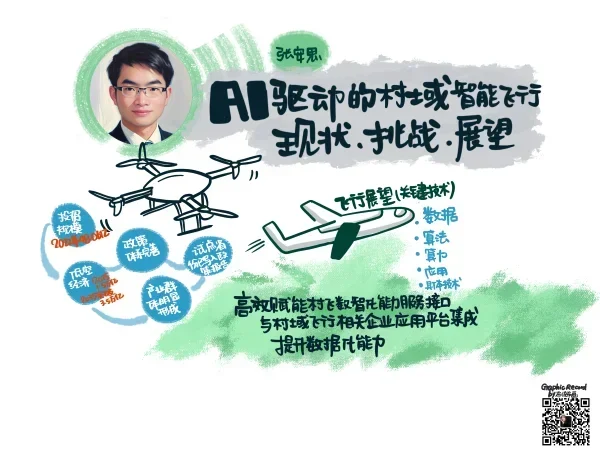
Zeng Xuehai | The rise of individuals: personal content creation in the AI era
ThinkWorks engineer Zeng Xuehai conducted an in-depth analysis of the living conditions of individual creators, raised thought-provoking questions, and explained the career changes and commercialization models caused by artificial intelligence from a personal perspective. Faced with the dual challenges of employment pressure and content homogeneity, he demonstrated the potential of artificial intelligence to provide comprehensive support for individual creators from the entire process of creative conception to the completion of the work.
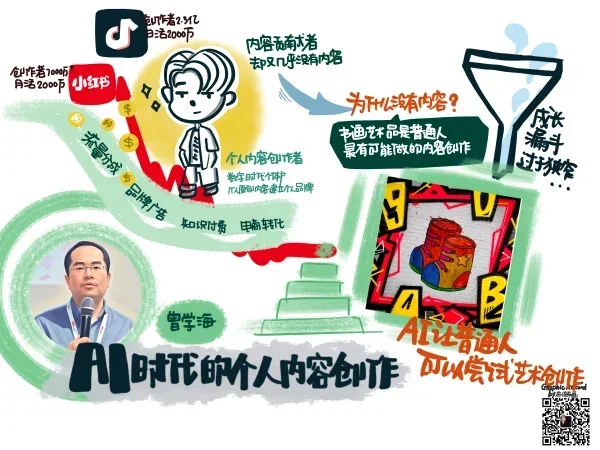
Zeng Lei | When AI meets work: Let machines work for you
Zeng Lei, the independent developer of Orris AI, talked about the comprehensive application of AI in work from his own entrepreneurial experience, and demonstrated how to use AI to achieve full-process automated development from requirements to code, making "machines work for you" possible. For counties, the biggest bonus may not be blindly attracting large enterprises, but activating countless "super individuals" empowered by AI.
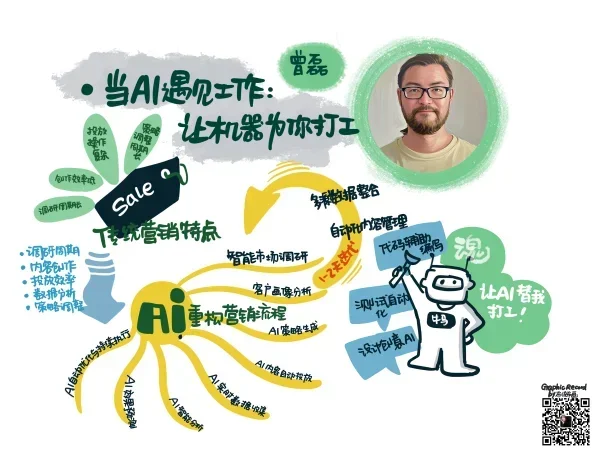
Topic 3From "black box" to "usable": equal rights and innovation of technical architecture
The popularization of AI in counties ultimately depends on the progress of technology itself and the innovation of architecture. How to make advanced technology stable, reliable, easy to use, and able to handle unstructured and small sample data commonly seen in county scenarios is the focus of technical experts in this session.
Xu Ji | Leading tree structure: making big models smarter in "small data" scenarios
Xu Ji, a distinguished professor at Guizhou University, proposed a "multi-granularity big data intelligent analysis based on leading tree structure" method to address the pain points of "many and chaotic county data and few annotations". This technology can more efficiently select the most representative samples from unlabeled data, greatly reducing the cost of data annotation, and improving the performance of the model in complex tasks such as long-tail classification and graph neural network, providing a new technical weapon for solving the problem of county data governance.
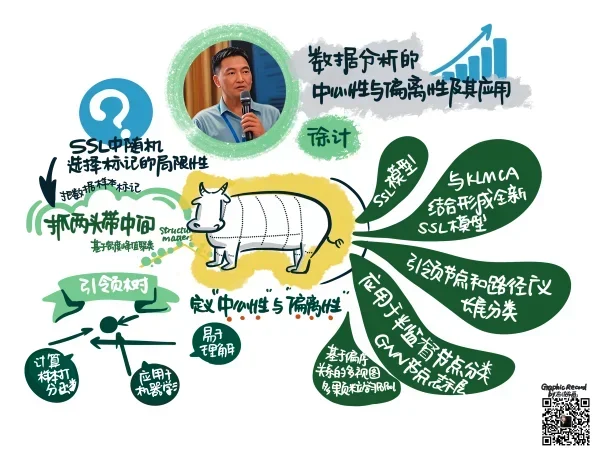
Wang Hongliang | Chain of Thought: Deconstructing complex problems to make AI more "thinking"
Dalian Shunzhi CEO Wang Hongliang introduced the construction method of "Chain of Thought". When faced with common complex business demand problems, the results obtained from simple conversations are often unsatisfactory. The Chain of Thought technology significantly improves the analysis accuracy of AI by deconstructing, solving and integrating complex problems and simulating the logical reasoning process of humans. This paves the way for the development of intelligent systems that "understand" complex needs better.
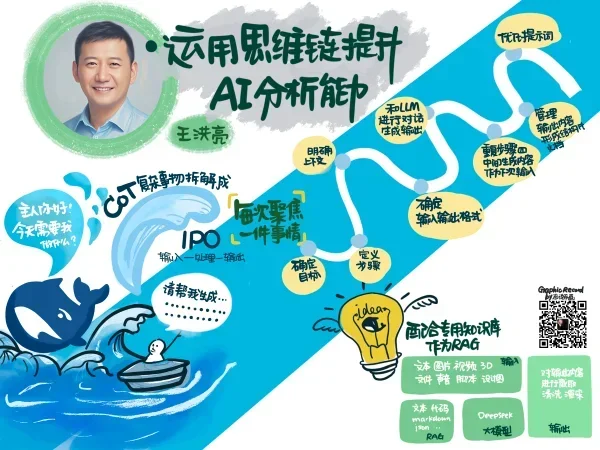
Zhu Junjie | RAG Technology: Breaking the "Model Illusion" and Creating a Land-Based AI Policy Consultant
Shanghai Fulizhi CEO Zhu Junjie focused on the application of RAG (Retrieval-Augmented Generation) technology in government services. Fast policy updates, vague consulting questions, and model "illusions" are the core obstacles to the implementation of AI in government scenarios. Through the RAG solution that combines intelligent search, data governance, and knowledge graphs, he demonstrated how to build an AI service system that can provide all-round and accurate policy consulting, so that technology can truly serve the people.
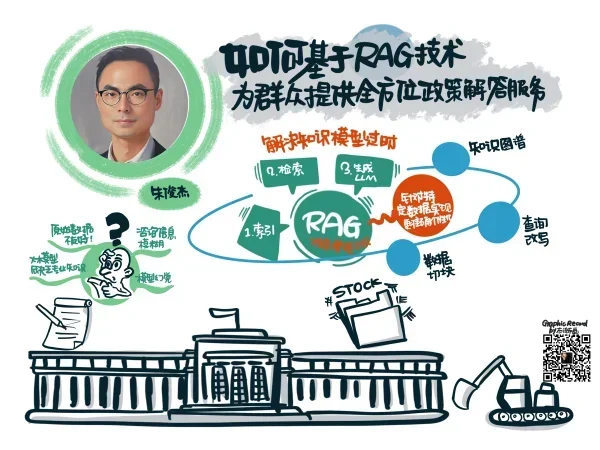
Conclusion
Through in-depth exchanges of ideas, this seminar systematically explained the three major paths of AI empowering the development of Chinese counties: cognitively, from instrumentalism to paradigm theory; industrially, from external transfusion to endogenous hematopoiesis; technically, from model-based to architectural innovation.
Rooting research in the land of the motherland is not just a slogan, but a call to action. The future of AI in counties is not a purely technical issue, but a profound issue concerning development model, social equity and civilization. The experience and challenges of this transformation taking place in China's "nerve endings" may also provide a unique reference from China for other countries and regions in the Global South that are committed to digital transformation.
Editor: Wu Yifan